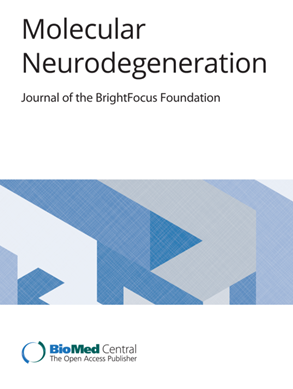Fluid biomarkers for amyotrophic lateral sclerosis: a review
IF 14.9
1区 医学
Q1 NEUROSCIENCES
引用次数: 0
Abstract
Amyotrophic lateral sclerosis (ALS) is a fatal neurodegenerative disease characterized by the loss of upper and lower motor neurons. Presently, three FDA-approved drugs are available to help slow functional decline for patients with ALS, but no cure yet exists. With an average life expectancy of only two to five years after diagnosis, there is a clear need for biomarkers to improve the care of patients with ALS and to expedite ALS treatment development. Here, we provide a review of the efforts made towards identifying diagnostic, prognostic, susceptibility/risk, and response fluid biomarkers with the intent to facilitate a more rapid and accurate ALS diagnosis, to better predict prognosis, to improve clinical trial design, and to inform interpretation of clinical trial results. Over the course of 20 + years, several promising fluid biomarker candidates for ALS have emerged. These will be discussed, as will the exciting new strategies being explored for ALS biomarker discovery and development.肌萎缩性脊髓侧索硬化症的体液生物标志物:综述
肌萎缩性脊髓侧索硬化症(ALS)是一种致命的神经退行性疾病,其特征是上下运动神经元的丧失。目前,美国食品及药物管理局(FDA)批准了三种药物来帮助 ALS 患者减缓功能衰退,但还没有治愈的方法。由于 ALS 患者在确诊后平均寿命只有 2 到 5 年,因此显然需要生物标志物来改善对 ALS 患者的护理,并加快 ALS 治疗方法的开发。在此,我们回顾了为确定诊断、预后、易感性/风险和反应液生物标志物所做的努力,目的是促进更快速、更准确的 ALS 诊断,更好地预测预后,改进临床试验设计,并为解释临床试验结果提供信息。在 20 多年的时间里,出现了几种很有希望的 ALS 候选体液生物标志物。我们将讨论这些候选体液生物标志物,并探讨 ALS 生物标志物发现和开发方面令人兴奋的新策略。
本文章由计算机程序翻译,如有差异,请以英文原文为准。
求助全文
约1分钟内获得全文
求助全文
来源期刊

Molecular Neurodegeneration
医学-神经科学
CiteScore
23.00
自引率
4.60%
发文量
78
审稿时长
6-12 weeks
期刊介绍:
Molecular Neurodegeneration, an open-access, peer-reviewed journal, comprehensively covers neurodegeneration research at the molecular and cellular levels.
Neurodegenerative diseases, such as Alzheimer's, Parkinson's, Huntington's, and prion diseases, fall under its purview. These disorders, often linked to advanced aging and characterized by varying degrees of dementia, pose a significant public health concern with the growing aging population. Recent strides in understanding the molecular and cellular mechanisms of these neurodegenerative disorders offer valuable insights into their pathogenesis.
 求助内容:
求助内容: 应助结果提醒方式:
应助结果提醒方式:


